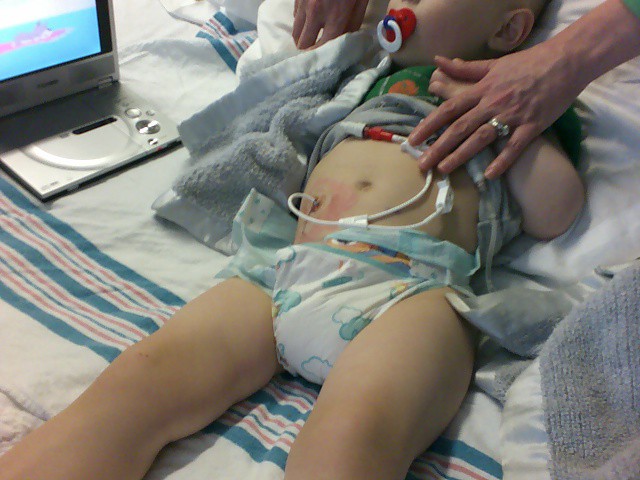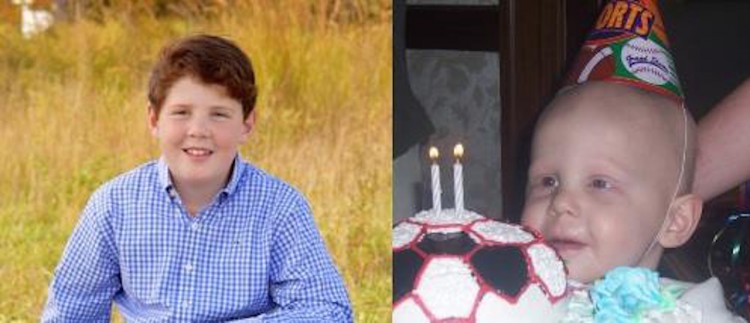Why We Didn't Give Up When Doctors Said Our Son Was Incurable

It was September 19th 2006. My son had just turned 2 years old a few weeks earlier and we had a meeting scheduled at the Jimmy Fund Clinic on this date to review his most recent scans. It had been about 18 months since he was diagnosed with stage IV neuroblastoma as an infant, and after his cancer came back he tried and failed his initial salvage chemotherapy. This meeting was to discuss the results of the next therapy.
It was an unusually grueling and intense five rounds of high dose chemotherapy, which made for a very difficult and challenging summer for our then 1-year-old boy.
When I first felt an enlarged lymph node in my infant’s neck, I immediately knew something was horribly wrong. When I walked into this meeting room, filled with strangers wearing long white coats and even longer faces, I once again knew the news was not going to be good. The head of the childhood cancer program at Dana Farber then gave us the news: our son was incurable.
He had exhausted all known curative therapies for his disease and stopping treatment was an option for us to consider.
Neuroblastoma is the most common cancer in infants — the most common solid tumor in childhood outside of the brain — and while it accounts for only seven percent of all childhood cancers it accounts for 15 percent of all childhood cancer deaths.
You’ve never heard the word “neuroblastoma” before? Neither had I, despite the fact it is one of the top ten leading causes of every death in the US for kids between one and 14 years of age.
And so there we sat in a roomful of strangers suddenly drowning in this new reality.
Isn’t there something we can do? Anything?
Are we just supposed to take our only child home and watch as his cancer erupts and have his only medical intervention be pain relief?
The grief of losing a child is devastating enough, and I had to wonder whether I could survive if that grief was served with a helping of guilt and regret for not trying?
Do I want my regret to instead come from the fact I did nothing, or because we tried something that only made his battle worse?
This was a critical fork in the road and the first time I became fully aware that it was 100 percent our choice to make.

With a decade of hindsight, I have come to the realization that all you can do at these critical junctures is to go ahead to a theoretical day where you child is gone and you look back at this point in time. And when looking at your choices, consider which of those would leave you with the least amount of regret. It is at this point that you will know what the right choice is for you to make at this time.
You can never escape the grief of losing your child — but you can at least try to mitigate the guilt.
And so that is how we moved forward.
He was my only child. I wanted to give him every chance to live. And so we started on a journey to find, and eventually fund treatment options that did not yet exist in the hope that we could keep him alive.
And here we are — 10 years out from that meeting where we were told that we should take our son home to die because there was nothing we could do to save him.
It has been a very difficult 10 years filled with unbelievable stress, hard work, fear and worry.
It has also been an amazing 10 years filled with love, happiness, smiles, siblings and life.
An otherwise indefensible hope was realized, and not only did we finally find a treatment to help our child, but we have seen a dramatic shift in survival for this disease.
I have a 12-year-old son who is a 7th grade student, who plays hockey and lacrosse and has two amazing younger sisters.
I have a 12-year-old son who is now three and a half years off all tumor-directed therapy.
I have a 12-year-old son, because a group of people decided that every kid with relapsed neuroblastoma dying was not good enough. That we could do better.
And so after a decade of fundraising, consortium building and doing all we can to empower an incredible team of doctors, I am incredibly proud to stand hand in hand with other neuroblastoma families across the country. We have created a national non-profit that not only saved my son’s life, but is also dramatically improving survival for every child with neuroblastoma.

